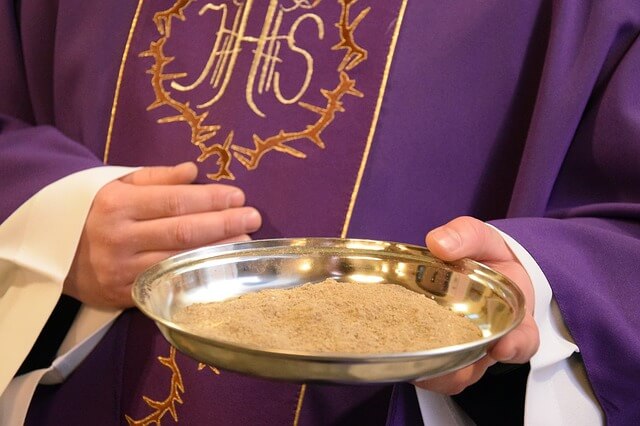Ash Wednesday (Dies Cinerum) is the first day of Lent, on which the pastor puts ashes on a Christian forehead. This act symbolizes heartfelt repentance. What is the history and significance of this holy day for Christians?
Ash Wednesday has an original name as dies cinerum (ash day). The Pope Gregory was the first to mention it in the oldest copies of the Pope Gregory’s Treasury. These copies dated from the end of the VIII century. There is one of the earliest descriptions of Ash Wednesday in the writings of the Anglo-Saxon abbot Elfric (955-1020).
In the Lives of the Saints, he writes: “We read in the books of both the Old and New Testaments that people who repented of their sins sprinkled themselves with ashes and clothed their bodies in rags. We will do this little at the beginning of our Lent. We will sprinkle our heads with ashes to commemorate the fact that we should repent of our sins during Lent.”
Elfric then tells the story of a man who refused to come to church on Ash Wednesday. Afterwards he died a few days later as a result of an accident while hunting a boar. This quote confirms that during the Middle Ages people sprinkled ashes on the head rather than applied them to the forehead, as they do it today.
Elfric mentions that dusting someone’s body with ashes, as an external sign of inner repentance or sorrow, is an ancient custom. It is very common in the Old Testament. Perhaps the earliest mention we find at the very end of the book of Job. The convicted Job confesses: “I deny and repent of dust and ashes” (Job 42: 6).
We find other examples in 2 Samuel (13:19), in the book of Esther (4: 1,3), in the book of the prophet Isaiah (61: 3), in the book of Jeremiah (6:26), in the book of Ezekiel ( 27:30) and in the book of Daniel (9: 3). In the New Testament, Jesus Christ refers to this custom in Matthew (11:21): “Woe to you, Chorazin! Woe to you, Bethsaida! For if the forces manifested in you had been manifested in Tire and Sidon, then long ago they would have repented in sackcloth and ashes.”
In the order of Ash Wednesday, Christians get an invitation to the altar to lay ashes. The pastor puts the sign of the cross on the forehead of each person with the ashes. Meanwhile he pronounces such words as: “You are dust and you will return to dust” (Gt 3:19).
God said these words to Adam and Eve after they sinned by eating the forbidden fruit. These words meant for our first parents the bitter fruit of their sin, namely death. In the context of laying ashes in the Ash Wednesday, they remind everyone who confesses his sinfulness and mortality, as well as the need to repent and restore relations with God, while there is still time for this.
The cross reminds everyone of the good news. That through crucified Jesus Christ we receive the forgiveness of all sins, all guilt and all retribution for sin.
Many Christians do not erase the sign of the cross from the forehead and in the rest of the day. This happens not from hypocrisy (see Matthew 6: 16-18), but as evidence that all people are sinners and need repentance, and that through Jesus Christ, faith in Him, God forgives us all our sins.
No one mentioned the Ash Wednesday, like Great Lent, in the Scriptures and God hasn’t commended to honor it. Christians are free to both honor and not honor this day. But, of course, the laying of ashes, like other similar rites, is pointless, even hypocritical, if people do not associate it with inner repentance and a change in lifestyle.
Nevertheless, taking into account what has been said, the Church strongly recommends the Rite of Ash Wednesday to Christians. As this is a wonderful opportunity for repentance and spiritual renewal in confession and forgiveness of sins.
Blessed Ash Wednesday!







